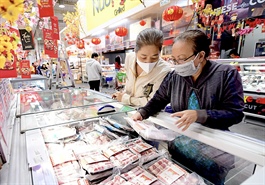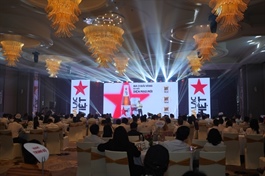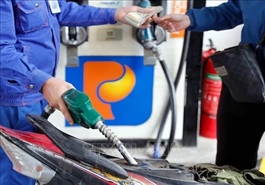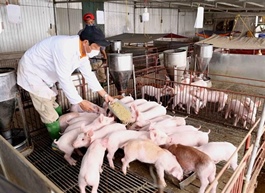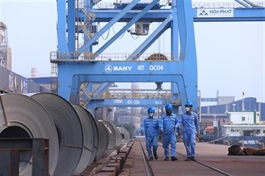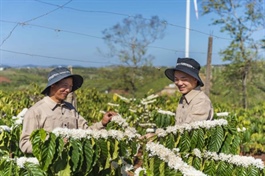Clear processes sought for direct power purchasing
Clear processes sought for direct power purchasing
A lack of specific instructions on transmission tariffs, contract management, and system operation fees is making it difficult for businesses to calculate costs when participating in a direct power purchase agreement.
Nguyen Ngoc Quynh, deputy director of SolarBK Group, said that the newly released Decree No.57/2025/ND-CP on direct power purchase agreements (DPPAs) marks a significant regulatory advancement, removing the previous 200,000 kWh/month threshold and expanding eligible participants.
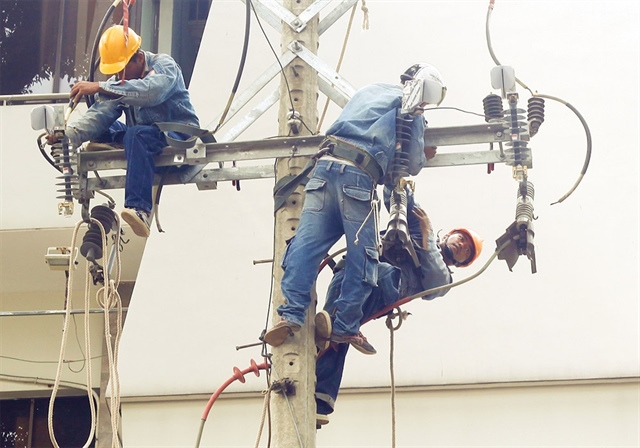
Investors want clarity on distribution service fees and grid connection responsibilities, photo Le Toan |
However, many core contents still do not have guiding circulars, such as how to calculate transmission and distribution fees, standard contract forms, or payment procedures, making it difficult for parties to implement plans in practice.
“One of the top requirements from the business community is a clear, detailed guiding circular from the Ministry of Industry and Trade (MoIT),” Quynh said. “Companies are urging the government to clarify key aspects of the DPPA framework, including how to calculate and apply transmission and distribution service fees, grid connection responsibilities, and technical requirements for projects connecting via private or national grid lines.”
Many also seek clear procedures for contract registration, market settlement, and the timeline for annual reconciliation of price differences between DPPA contracts and spot market prices, added Quynh.
Under Decree 57, a DPPA encompasses two models: one via a private wire and a second via the national grid. The latter model not only enhances energy efficiency but also drives the adoption of sustainable energy solutions. By linking renewable energy producers with major electricity consumers through virtual connections, this model significantly influences Vietnam’s energy landscape.
Nguyen Van Truong, director of renewables group The Blue Circle Vietnam, said that although there is a guiding policy framework for direct electricity trading, not many people are interested in implementing it for the following reasons grid transmission price.
“The transmission grid in many regions, especially the central and southern regions, is overloaded. This greatly affects the ability of renewable energy projects to connect to consumers. Without the ability to transmit electricity to the point of consumption, the DPPA model will be ineffective or unfeasible. Moreover, policy gaps like undefined transmission costs create uncertainty,” said Truong.
He explained renewable electricity through DPPAs is currently not significantly cheaper than electricity from Vietnam Electricity (EVN), while the payment process is complicated. Enterprises still have to pay additional transmission/distribution fees, but the financial benefits are not clear.
“Without a green electricity target, most enterprises will not see the motivation to participate,” Truong said.
According to Ngu Truong, managing partner at law firm Vilasia, such a lack of transparency or detail can make investors hesitant before making a move.
“Contracts for difference are the backbone of DPPAs, in which fixed electricity prices are set for the duration of the contract. However, if businesses lack understanding of price adjustment mechanisms, risk allocation or dispute resolution procedures, the negotiation process can be lengthy. This affects both project progress and costs” he said.
Businesses recommend the development of standardised contract templates to simplify negotiations and reduce legal risks. Without model contracts, companies are forced to invest time and resources into complex legal structuring, which may deter small and medium-sized enterprises from participating, he added.
Another strong recommendation is the establishment of a pilot phase or sandbox programme, allowing a limited number of DPPA projects to proceed under monitored conditions. This would help identify operational and legal challenges, build confidence in the market, and create case studies to inform future scaling.
Lastly, Truong from Vilasia said, companies are calling for inter-agency coordination between EVN, local and top authorities, and market operators to avoid delays in approval processes and ensure consistent interpretation of the law nationwide.
Many foreign-invested enterprises in Vietnam are showing strong interest in the DPPA mechanism, as it helps them meet renewable energy consumption goals and obtain green production certifications. According to a survey by the MoIT, about 20 major foreign companies, including global corporations like Samsung and Nike, have expressed their intention to participate in DPPAs with a total demand of nearly 1,000MW.
- 11:23 11/04/2025









